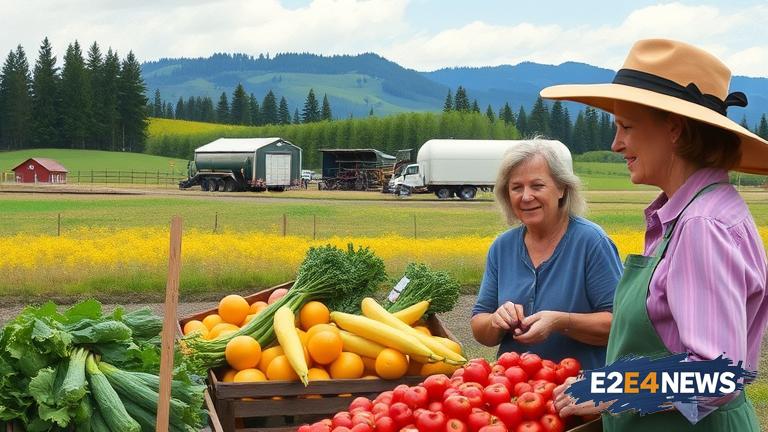In a move that has been welcomed by family farms and local food enthusiasts, Oregon Governor Tina Kotek has announced a pause on proposed rule changes that would have impacted farm stands across the state. The proposed changes, which were aimed at improving food safety, had sparked concerns among farmers and consumers alike. Many had argued that the new rules would have been too restrictive, forcing small-scale farmers to invest in expensive infrastructure and potentially driving them out of business. Governor Kotek’s decision to pause the rule changes has been seen as a victory for the state’s agricultural community, which has been working tirelessly to promote local food systems and support small-scale farming. The pause will allow for further discussion and consultation with stakeholders, including farmers, consumers, and food safety experts. This move is expected to have a positive impact on the state’s economy, as local food systems are a significant contributor to Oregon’s agricultural industry. Family farms, in particular, will benefit from the pause, as they will be able to continue operating their farm stands without the burden of excessive regulations. The proposed rule changes had been met with opposition from many in the farming community, who argued that they would have been too restrictive and would have stifled innovation and entrepreneurship. Governor Kotek’s decision to pause the changes has been praised by farming organizations and advocacy groups, who have been working to promote and protect the interests of small-scale farmers. The pause will also allow for a more nuanced discussion about food safety and the role of regulation in promoting public health. While food safety is a critical concern, many argue that the proposed rule changes would have been overly broad and would have had unintended consequences. The decision to pause the rule changes is a testament to the power of community advocacy and the importance of listening to the concerns of stakeholders. It is also a recognition of the value of local food systems and the role that family farms play in promoting food security and sustainability. As the state moves forward, it is likely that there will be ongoing discussions about the best way to balance food safety with the needs of small-scale farmers. Governor Kotek’s decision to pause the rule changes has created an opportunity for a more collaborative and inclusive approach to regulation, one that takes into account the diverse needs and perspectives of stakeholders. The pause will also allow for a more detailed analysis of the potential impacts of the proposed rule changes, including the potential economic and social consequences. This will be an important step in ensuring that any future regulations are fair, effective, and supportive of the state’s agricultural community. In the meantime, family farms and local food enthusiasts will be able to continue enjoying the benefits of Oregon’s thriving local food scene, including the ability to purchase fresh, locally grown produce directly from farmers. The pause on the proposed rule changes is a significant development in the ongoing conversation about the future of food systems in Oregon, and it will be important to continue monitoring the situation as it evolves. As the state moves forward, it is likely that there will be ongoing debates about the best way to promote food safety, support small-scale farmers, and protect the interests of consumers. Governor Kotek’s decision to pause the rule changes has created an opportunity for a more nuanced and collaborative approach to these issues, one that takes into account the diverse needs and perspectives of stakeholders. The future of Oregon’s local food scene will depend on the ability of policymakers to balance competing interests and priorities, while also promoting the values of sustainability, equity, and community engagement. By putting the brakes on the proposed rule changes, Governor Kotek has taken an important step in the right direction, one that will allow for a more thoughtful and inclusive approach to regulation. The pause will also allow for a more detailed examination of the potential benefits and drawbacks of the proposed rule changes, including the potential impacts on small-scale farmers, consumers, and the state’s economy. This will be an important step in ensuring that any future regulations are fair, effective, and supportive of the state’s agricultural community. In conclusion, Governor Kotek’s decision to pause the proposed rule changes is a significant development in the ongoing conversation about the future of food systems in Oregon. It is a testament to the power of community advocacy and the importance of listening to the concerns of stakeholders. As the state moves forward, it will be important to continue monitoring the situation and promoting the values of sustainability, equity, and community engagement.
